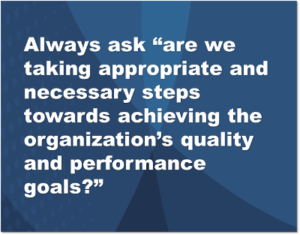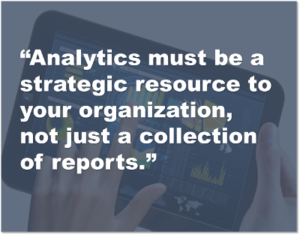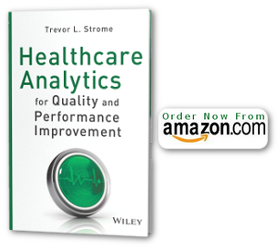 As I mentioned in my previous blog post How To Position Analytics as a Strategic Resource Within Your Organization, context is what frames the various challenges and pressures facing an organization, and describes what and why the organization is striving to improve. Common areas of innovation and improvement being sought by many organizations include:
As I mentioned in my previous blog post How To Position Analytics as a Strategic Resource Within Your Organization, context is what frames the various challenges and pressures facing an organization, and describes what and why the organization is striving to improve. Common areas of innovation and improvement being sought by many organizations include:
- Quality – how well the enterprise is doing what it is that it’s supposed to be doing,
- Financial – how cost-effective the enterprise is in conducting its operations,
- Performance – how efficient the organization is, and
- Satisfaction – how happy key clients/customers are with the service received, or outcomes obtained.
In essence, context is what connects what an organization is trying to improve with the methodology how it is going to achieve those improvements, and how it is going to monitor and evaluate progress. The key components of context consist of:
- Goals – description of what the organization is improving, and by how much,
- Strategy – the approach(s) such as Lean or Six Sigma to be used to achieve desired improvements (important because which QI approaches are utilized will impact what data is required, how it is analyzed, and how it is communicated).
- Measurement – the indicators to monitor progress towards improvement, and the methods used for obtaining and summarizing data.
In an organization, stakeholders are those people who use and/or rely on, develop, or are impacted by analytics. Stakeholders range from executives in the “corporate office” to personnel working on the front-lines of the enterprise. A clear and thorough understanding of context by the various stakeholders guides the development of appropriate analytics tools (including dashboards, simulations, and data analyses) that helps to ensure both ongoing and planned improvement activities throughout the enterprise are aligned and support of improvement goals.
The objectives of improvement initiatives should align with the quality objectives of the enterprise as a whole. This prevents even further misdirected/wasted activity and enables monitoring progress and outcomes. When deploying analytics, always ask “are we taking appropriate and necessary steps towards achieving the organization’s quality and performance goals?” Without clearly stated goals, a viable approach to achieving the goals, and a commitment to measure performance, any attempt at “improvement” will likely result in disjointed (at best), or conflicting (at worst) changes to policies, processes, and workflows, that may be ultimately detrimental to quality, performance, efficiency, and client satisfaction.
{ 0 comments }

